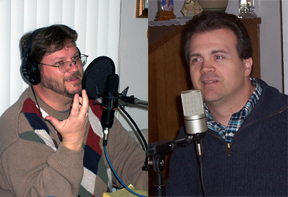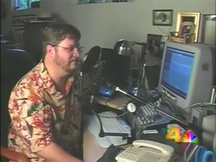I am often asked to talk about the steps I go through to create my podcasts, so I began to outline my methods a few weeks ago. I have been podcasting for over 2 years now, so most of this process is internalized, but it is probably a good idea for me to review the process to see if there is any way I can streamline it.
A word of warning, though, since I have been podcasting for so long, some of my methods have been superseded by much better methods. I am simply being slow to change the systems I have been using as they continue to operate well for me. I will mention the alternatives as I detail the process.
Creating the content
My main podcast, Career Opportunities, is a print column first. It appears in ComputorEdge in San Diego, California. This means that each podcast has been written, usually in MS Word, up to 6 weeks before it appear in the magazine and as a podcast. My other podcasts are more freeform and usually are recorded directly from an outline or loose notes.
Since each show is pre-written, I am able to move to the recording stage of my podcast without much more work.
Recording
When I first started recording my podcast I used the tools at hand, which meant Apple’s Garageband. In fact, the theme music you hear at the beginning of every show is made from 2 music loops that ship with Garageband.
I record each podcast directly into Garageband, preserving the music and the outro from the previous show. I lay down the intro, adding a changing piece of contact information and the show title. Then I begin recording the actual column.
I try to record about a paragraph at a time from the written column. If I make a mistake, I immediately stop the recording, trim the offending part and start recording again from that point. I do this to avoid the “Oops” problem, where unedited sections of audio make it into your final product. I occasionally hear this in my friend’s shows, so I use this method to avoid it.
Once the entire show is recorded, I go back to the beginning and begin tightening up the breaks between each recorded section. This usually means bringing the clips closer together so the breaks sound natural, as if I recorded the entire show in one (excellent) take. If only that were the case. (SMILE)
Once the show is complete, I select the Share to iTunes menu choice in GarageBand. This mixes down all the individual tracks and moves and AAC file over to Apple’s iTunes software.
Titling, Tagging and Conversion
Once the show appears in my iTunes Library I add an appropriate title, Artist, Show Title, notes (including URLs and contact info) and the graphic artwork for the show. Once complete, I use iTunes conversion options to convert the file to a standard MP3. In the beginning, I usually converted the show to a 64kbps MP3 file, but as time has passed and my recording quality has increased, I regularly produce this final file at 96kbps or even 128kbps. This results in a larger file but with a short show (around 6 minutes) it doesn’t cause a significant impact on files size or download time.
Once converted, I listen to the show to check for MP3 compression artifacts or other errors. Then I locate the file on the hard drive and name it appropriately for the web. These names take the form of career-op-20061020.mp3, where the numbers indicate the date the show was released. This means that even if a listener is not using iTunes or other MP3 player that can view the ID3 tags in the file, it still indicates that this is a Career-Op episode from a specific date.
This MP3 file is then uploaded to my web site, currently hosted at GoDaddy.com. I use YummyFTP as my Macintosh FTP client. There is a standard file structure on my web site that makes it clear where each file should reside.
Once the files is uploaded, I access the MP3 directly using my web browser to ensure that it plays correctly.
Web pages, Blogs and RSS Feeds
One oddity that arises from my early start in podcasting, and the fact that Career-Op is a written column, is that I post the full text of each show to my web site. Each column gets its own static web page which also direct links to the MP3 file. I create this file using Dreamweaver, based on the page from the previous week. I then test that file, using my web browser.
Next, I create the blog post for the main Career-Op page that announces the new show and links to the static columns page and the MP3 file. I use Blogger.com to create all of my blogs. One artifact from using Blogger is that it cannot create the RSS 2.0 with enclosures file that is required for podcasting. Other blogging software can do this, but I have not yet made the transition to these newer systems. Blogger does create an ATOM formatted feed, which is an RSS derivative.
To work around this issue, I use the services of FeedBurner.com. FeedBurner can take the Blogger-created ATOM feed and process it into a podcast-compatible RSS 2.0 feed, while adding a number of other features including iTunes specific ID3 tags, advertising and more. My subscribers then subscribe directly to this FeedBurner-created feed to receive my podcast automatically.
This is another artifact of my early start in podcasting. Today, while you might wish to use FeedBurner to create your final podcast feed, you should mask this feed behind a re-direct on your web site. For example, your subscribers might use the URL http://welchwrite.com/podcast.xml to subscribe to your podcast, this address might actually be re-directing the users to your FeebBurner feed. In this way, you retain full control of your feed and can easily stop using FeedBurner any time you wish without forcing all your listeners to re-subscribe to the new address.
Now, I post the blog entry to the blog using Blogger, which creates the new blog page and automatically moves to my web site, ready to be accessed by my readers and listeners.
Since FeedBurner is using the Blogger ATOM file to create its enhanced RSS feed, I also visit a special web page which tells FeedBurner that my basic RSS feed has changed and instructs it to update its RSS feed based on this new information. This would happen automatically within 30 minutes, but I prefer to force the update manually so I can check that the podcast downloads correctly.
At this point, my show is now available to the next listener who might request the RSS feed.
This is a very basic outline of my podcasting process and yours is sure to be somewhat different. In the interest of brevity, I have assumed quite a bit of knowledge, so if you have further questions on the process, please add your comments using the link below.
Keep podcasting…or get started today!







 This edition of On Podcasting is a recording of my presentation to the
This edition of On Podcasting is a recording of my presentation to the 
